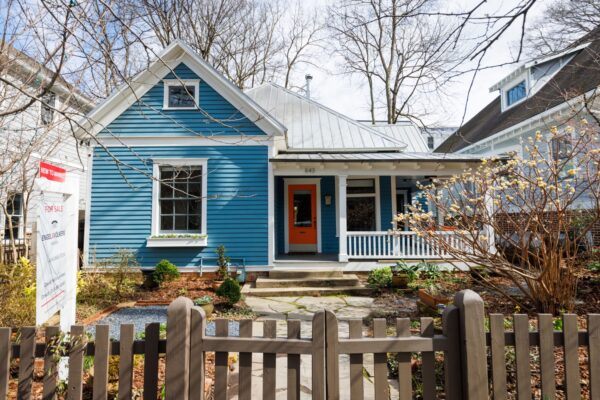By Jennifer Epstein and Paige Smith
Homebuyers and lenders adjusting to a doubling of US mortgage rates in the past year are finding workarounds to ease the financing pain.
Companies including Rocket Cos., Amplify Credit Union and Better are pitching incentives to cover the cost of future refinancing to buyers who lock in loans now. Some lenders are offering to buy down interest rates, often by one point for one year. Homebuyers are opting into adjustable-rate mortgages that carry slightly lower rates than fixed loans.

Their takeaway: A home is a long-term commitment, but borrowing costs can be temporary. Or as one frequently touted industry mantra goes, “marry the house, date the rate.”
As the US housing market heads into its key spring selling season with transactions and inventory effectively frozen, real estate agents and lenders are eager to lure rate-weary house hunters with incentives to juice deals. And after years of rock-bottom rates that made 30-year fixed-rate mortgages a no-brainer — even for people who could afford to pay cash — potential buyers have to find ways to cope with higher borrowing costs that have collided with still-elevated prices in much of the country.
Nearly all conversations with prospective homebuyers about locking in a mortgage involve some kind of an incentive to help with the rate in the interim, recognizing that the sales price is the focus, said Kevin Ginsburg, vice president of real estate lending production at Texas-based Amplify Credit Union, which recently began marketing no-cost refinancing within 24 months of the original closing.
“We’re seeing incredible traction with the offer,” he said.
But lenders’ deals and products only work out for borrowers if rates fall significantly within the next few years, a bet that comes with risk. Investors are expecting the Federal Reserve to raise interest rates at its next three meetings, according to swaps contracts. And even if the central bank stops its rate-hike campaign, it’s unlikely home-loan costs will drop to anywhere near the record-low levels seen during the pandemic — a potential problem for buyers who are pushing limits of affordability and cutting into other parts of their budgets to pay for mortgages.
“These are all very, very dependent on the situation of the borrower,” said Janneke Ratcliffe, vice president of housing finance policy at the Urban Institute, a Washington-based think tank.
The average rate for a 30-year fixed mortgage was 6.5% this week, down from a peak of 7.08% in November but up from less than 4% a year ago, according to Freddie Mac. The surge has battered the mortgage lending industry, leading to thousands of layoffs as business dries up. US home-purchase applications tumbled last week to the lowest level since 1995, according to the Mortgage Bankers Association.
Jumbos, Buydown
Wealthier buyers are faring better as banks looking to retain or attract high-net-worth customers offer lower rates. As of early February, a borrower with a $10 million net worth and a $5 million relationship with a private bank — including the mortgage — can secure a rate around 4.625% on a 30-year, fixed-rate jumbo loan, said Melissa Cohn, vice president at William Raveis Mortgage. Buyers with fewer assets are getting rates in the high 4% range and, even qualified borrowers without any assets in the bank are able to find 30-year, fixed jumbos around 5.5%.
For larger loans, buyers may be willing to bear the risk of rates staying at or above their current level for the term of an adjustable-rate mortgage to save a quarter or half a point on interest compared to what they can find for a 30-year fixed product.
“Not everyone is aware that there are jumbo loan rates you can get sub-5,” said Daniel Parker, co-head of New York new development at brokerage Compass. “And if you can get sub-5 and maybe a concession from the seller to buy down that rate, then all of a sudden we’re back in that neighborhood of where rates were a couple years ago.”
Buydowns — an upfront payment to temporarily reduce the rate of a home loan — are being pitched by lenders including Guild Mortgage and Rocket Mortgage, which have offerings to lower the borrower’s interest rate by one point for the first year of their mortgage. Some developers and individual sellers are also proposing to pay for temporary interest-rate discounts.
Adjustable-rate mortgages, which made up 4% or fewer of new home loans throughout 2021, also started to jump last year as rates climbed, reaching a high of 12.8% of loans in October, according to the Mortgage Bankers Association. As of Feb. 10, the share had fallen to 6.9%.
Companies such as Freedom Mortgage also are promoting assumable mortgages, where the buyer takes over the seller’s existing — presumably lower-rate — loan and pays cash or takes out a second mortgage to cover the rest of the purchase price. It’s still relatively little used, with Freedom Chief Operating Officer Mike Patterson estimating that roughly 1% to 2% of US mortgage volume involves the product. Buyers also can only assume mortgages backed by the Federal Housing Administration and Department of Veterans Affairs, which according to the Census Bureau together made up 14% of 2022’s new home loans.
But even without the incentives, buyers may be ready to come off the sidelines, Patterson said.
“You have a lot of pent-up demand between the last two years of the competition to get a home and the last six- to nine- months of higher interest rates,” he said. “A lot of people are just tired of waiting to buy the house that they really want to buy and they’ll probably stretch their budget a little farther than they originally planned.”
Future Refis
With promised free refinancing, a 30-year fixed mortgage is the least risky option for buyers compared with a standard loan without the incentive, an adjustable-rate mortgage and a buydown, said the Urban Institute’s Ratcliffe.
Refinancing comes with a string of upfront costs, including appraisal, title and escrow fees that on average total $5,000, according to Freddie Mac. If a borrower with a $500,000 loan refinances to a rate one point below her initial mortgage, she’ll save $5,000 in interest in a year, breaking even on the move.
Rocket has an offer to cover “a significant portion” of refinancing costs if rates drop within three years of buying a home. The program usually saves homebuyers around $2,000, said Bill Banfield, the Detroit-based lender’s executive vice president of capital markets. The company doesn’t waive all refinancing costs, but does cover fees for appraisal, credit report inquiries, processing and underwriting, among a few others.
Free refinancing was part of the calculus as Vic Chan, 44, and his wife shopped around to finance their purchase of a house in a Maryland suburb of Washington, D.C. They ultimately chose EagleBank, which gave them a 5.99% rate on a 30-year, fixed loan of $600,000 ahead of their March closing.
They aren’t stretching their budget, but the prospect of no-cost refinancing has made them more comfortable with taking on the mortgage.
“I don’t think we will get back to the historically low rates,” Chan said. “But I am hopeful for a lower rate in the next 12 to 18 months.”
(Updates mortgage rate data in ninth paragraph.)
More stories like this are available on bloomberg.com.




